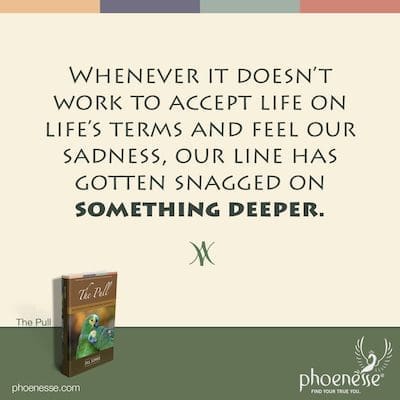All problems that mess up the mojo of the psyche wreak havoc on living. This is so because they hinder our ability to relate to others. Or we can turn that around and say: we need a healthy psyche if we want fruitful relationships. In relation to this, there are two decidedly different emotions, sadness and depression, that will be helpful to sort out because of the way they affect our ability to relate to others.

Even if we’re working on ourselves, diligently following a path of self-discovery, we can get discouraged. Then we stick out our lower lip and ask: “Where does any of this get me if I’m as unhappy and confused as before?” Two things. First, everyone who has ever made significant progress on a spiritual path knows exactly what we mean. But they carried on and results did come. Second, stagnation is always due to inner hiding—an unwillingness to take the blinders off. And the area where we get stuck most? Right at the doorstep of whatever would be the most important thing to look at in a given moment. We get stuck right there.
So when we get stuck and discouraged, we need to ask: “Where is the wall—inside me? What don’t I want to look at?” It’s bound to be lurking just beneath our justifications, self-pity, hopelessness or surface rationalizations. If we’re blaming, we’re blocking. Once we recognize what we’re avoiding, we’ll be further down the lane of liberation.
It’s a breeze to focus on outer actions; it’s a bear to face everything within. Evasion is a wily coyote. But let’s repeat: if we’re feeling stagnation, discouragement or depression because we’ve come to believe self-knowledge isn’t worth bupkis, we’re skimming over something important in some corner of ourselves.
In the most clear-cut cases, sadness and depression look nothing alike. We probably know this from our own individual past experiences with each. But sometimes they drop in at the same time, intermingling and overlapping. Sadness can make us believe there is no depression present. Or we might believe that our feelings of sadness and pain are purely normal but we overlook destructive elements lurking nearby. What we need to do is tease out any unproductive depression—and why it’s here—in spite of the presence of reasonable and rational sadness.
So what’s the diff? In sadness, we accept a painful life situation as being something we don’t have the power to change. There’s no self-pity and we know this too shall pass. It feels like a healthy growing pain that’s free from hopelessness. We’re not superimposing emotions, nor hiding them or shifting them.
With depression, the outer situation might be the same, but the pain we feel bleeds beyond to other reasons. Perhaps we still can’t change things external to us, but we can change what’s going on inside us. To do that, we’d need to look at some emotions that we’d rather not have to face, like hurts, resentments, envies, or our reaction to injustices.
But we’re powerless to change how we feel as long as we don’t fully understand what is going on. Depression, then, is directly linked with frustration and helplessness. Weird as it may seem, if we have a healthy attitude about a situation, we won’t feel helpless even if we’re powerless to change it. Depression crops up when we have a demand that something needs to change—pronto.
The log in our own eye that we fail to see is that there is always something we can change right now, which is our attitude. And that’s always, always, always an inside job. Whenever it doesn’t work to accept life on life’s terms and feel our sadness, our line has gotten snagged on something deeper. This is a biggie.
For example, when a loved one dies, we may of course be sad—and nothing else. Our feelings then are purely related to this loss. We know we can’t change things and that we will accept this eventually, despite our sorrow now. Even in the deepest depths of our pain, we know that our life will go on. Our bereavement doesn’t take anything away from us, no matter how much we loved the one who has departed. There won’t be a scar because any genuine direct emotion that is felt in a healthy way and not shifted into something else is an enriching experience.
But when we’re depressed over a loss, we’ve wandered into confusing, ambiguous and ambivalent emotions that we weren’t expecting. We are vaguely disturbed by them but we brush them off as being associated with the legitimate pain of our loss. So then we’ve shifted our emotions. We’ve used a valid occurrence to cover something up that we don’t want to come to terms with—maybe guilt, resentment or the like.
These may be connected with the loved one or we may have triggered off some festering, unresolved conflict. Matters not. Could even be a bit of both. Or maybe we identify with the one who died and it has perked up our own fear of death, or the fear that our life is passing before us and we’re not even paying attention. Since we’re living in unawareness we can’t cope, which causes us to feel depressed, not sad. Depression feels stifling, frustrating and distinctly unhealthy.
So what is so unhealthy about depression? We can start by looking at one of its byproducts: self-pity. It’s unhealthy because it’s unfounded. People, there is always a way out if we’re willing to look for it. But when mired in self-pity, we won’t look. We want the world around us to change, feel sorry for us and make special allowances.
With depression, we’re making up a story in our heads about why we’re unhappy. Then we label our false reason “legitimate” so we can justify our running away and wallowing in self-pity. This is how we subtly exert a forcing current on everyone around us. We’re controlling and manipulating through wrong use of our will.
Beyond all this, depression is unhealthy because nothing changes. We falsely accept what shouldn’t be accepted, and which we could change if we would face ourselves honestly. Simultaneously, we battle against that which we can’t change.
The extreme example of the death of a loved one makes sense to all of us. Just as often, we become depressed with a far less valid outer reason, and sometimes with no reason at all. We simply don’t know why. We cast around for excuses and explanations, but in our heart of hearts, we know good and well that the real reason is something totally different from our justifications.
So whenever we’re faced with depression, we need to check our inner corners for signs of frustration and hopelessness. And don’t forget to look for self-pity. We need to assess whether we understand that we aren’t harmed by sad and painful circumstances, but just need to go through these difficult feelings.
Only by finding the gnawing undercurrents that cause depression will we be able to free ourselves of the real cause. Otherwise, like a bad penny, it will come up over and over again. This will happen until we find and dissolve the root of the problem. It won’t happen by forcing away what we feel. We need to look at it with a calm head and an aim to understand it.
Dissolving the cause of depression is the way to free ourselves from unpleasant feelings. Even better though, it frees up parts of ourselves that could work for us and not against us. Depression robs us of our life and it is self-generating. But it’s an effect—it’s not the cause. Depression needs to be looked at as the problem itself, rather than something that will resolve itself on its own. Sometimes that happens, but then there is no protection against it recurring when life drops another bomb.
Regarding the use of medications to treat maladies such as depression, we must recognize that there is a difference between the mind and the brain. The brain is the physical instrument through which the mind manifests, but the mind is a much vaster organism. It has many areas including the conscious, unconscious, semiconscious and subconscious.
The mind is the instrument of consciousness and operates our thinking, reacting and even doing processes. The process of our will is controlled by our mind. It’s vast and it’s not tangible. But we can certainly see and feel the brain, through which a part of our mind manifests. Our brain is, in effect, an organ that is used by the mind.
When we use medication to establish a balance in the brain, it can relieve negative manifestations. Then a person can go to the root of the problem and sort out their wrong conclusions that lie beneath the illness, healing it at its origin. When we don’t do this excavation work, the symptoms are temporarily relieved but the organ remains sick.
So a pain-removing drug may bring a certain relief, and that may help us do what is needed to uproot the cause of our illness—because we can’t do much of anything while we’re struggling in pain—but then we may be satisfied with the relief we get from removal of the symptoms, and not go through to unwinding the real root cause.
Return to The Pull Contents
Read Original Pathwork® Lecture: #106 Sadness versus Depression – Relationship



